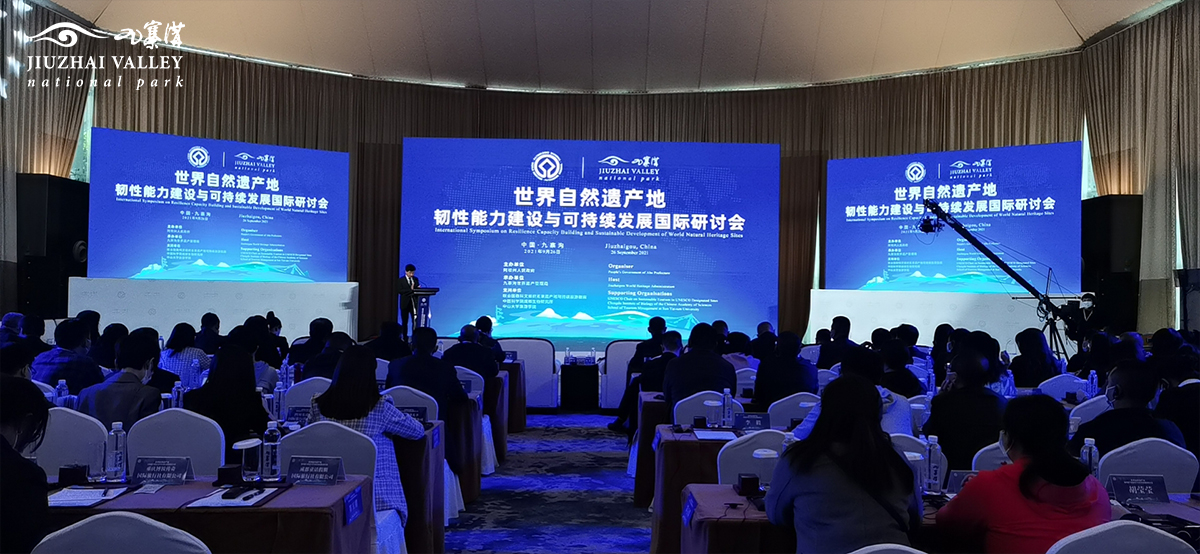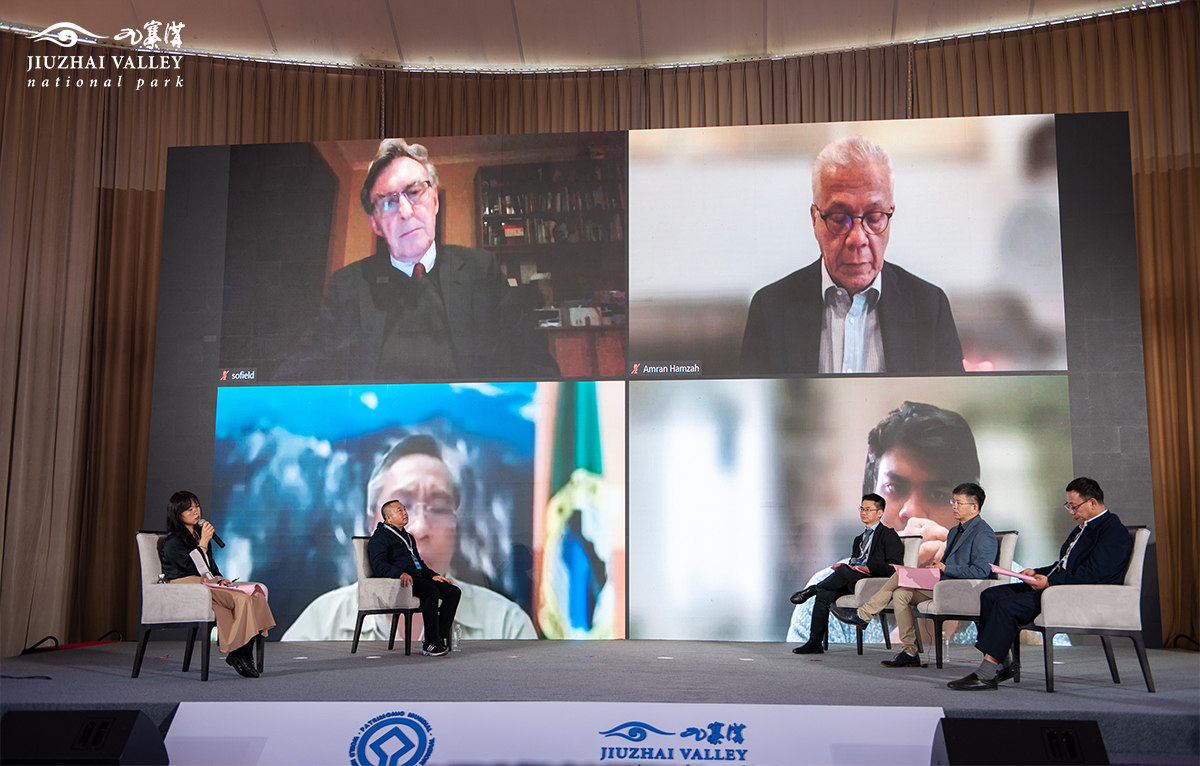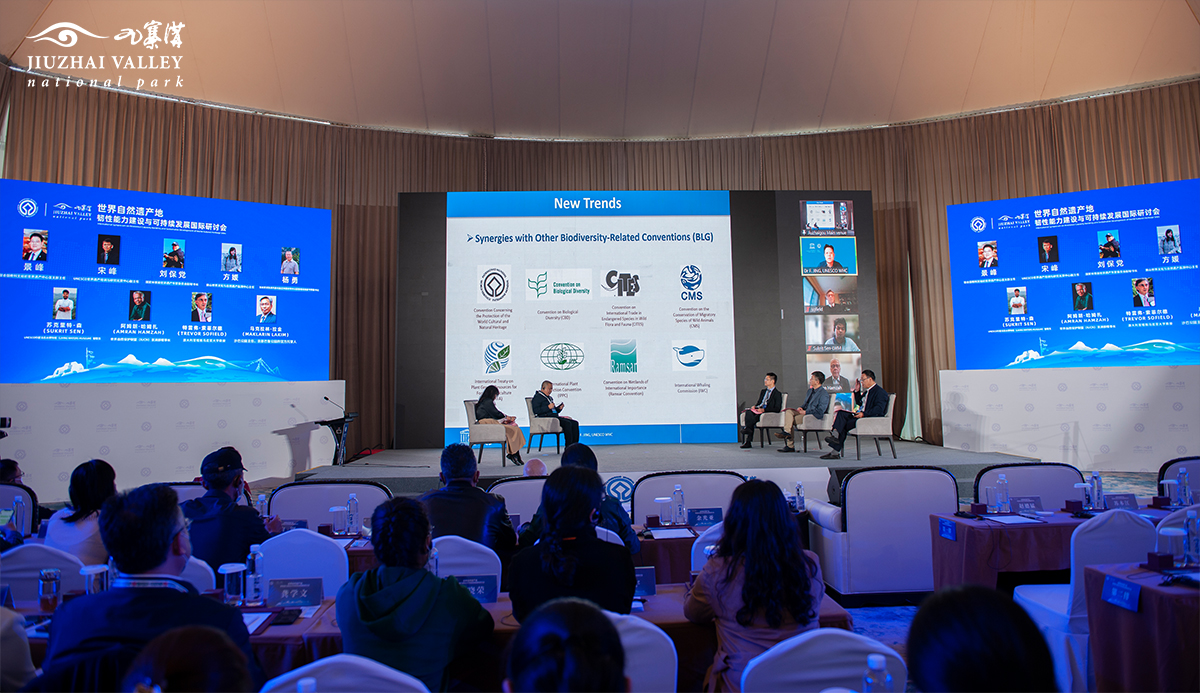全球世界自然遗产地日益面临自然与人为、传统与非传统负面影响。暴雨、地震、飓风、海啸等自然灾害频发,致多个世界遗产遭受灾难性打击;新冠病毒的全球化蔓延,使旅游者数量骤减,对遗产地保护管理产生深刻影响。加强世界自然遗产地韧性能力建设与可持续发展已成为全人类共同的责任。

自2017年7.0级地震以来,九寨沟世界自然遗产地在灾后恢复重建的同时,积极应对疫情考验。在“2021年四川省文化和旅游发展大会”召开即九寨沟世界遗产地全面恢复开放之际,世界自然遗产地韧性能力建设与可持续发展国际研讨在九寨沟举行。参与本次会议的有联合国教科文组织、世界自然保护联盟等国际组织机构、国内外世界自然遗产地代表与院士专家。会议达成以下共识。

1.世界自然遗产是自然赠与人类的瑰宝,为我们提供了重要的生态服务系统,优抚和启迪了人们创新创造,是人类记忆的重要场所。作为自然的一部分,我们必须尊重自然、顺应自然、保护世界自然遗产,并将此作为义不容辞的重要责任,使之成为人类文明进程不可缺失的重要载体。
2.世界自然遗产地面临日益增加的不确定性风险,管理者应加强与联合国教科文组织、世界自然保护联盟等国际组织的联系,寻求专业指导,同时积极搭建良好的伙伴关系网络,强化遗产地之间及科研机构、保护性组织等的经验交流,促进技术合作。
3.世界自然遗产地的灾后恢复重建必须严格遵守《世界遗产公约》及操作指南,落实世界遗产突出普遍价值要求,组织跨学科、跨领域协作,广泛征求各政府部门、社区居民等利益相关者和专业机构、社会公众意见,科学编制灾后恢复重建规划及方案,结合传统与现代技术,以自然恢复为主、人工干预为辅,实施环境友好、影响最小的修复恢复。
4.世界自然遗产地应提升防灾减灾、生态环境保护、健康安全意识,采取有力措施防治地质灾害和提升气候灾害、新冠疫情等传统与非传统威胁的应对能力,保障遗产地居民、旅游者和生态系统安全。
5.世界自然遗产地应加强适应性管理,尤其是推进大数据、人工智能等新技术在规划和保护管理中的应用,完善监测调控体系,对应实施同步的人才培养计划,扩大宣传教育,提升遗产地保护管理能力和全面加强韧性能力建设。

Jiuzhaigou Consensus on Resilience Capacity Building and Sustainable Development at World Natural Heritage Sites
The global World Natural Heritage sites are increasingly facing traditional or non-traditional negative impacts brought by nature and human society. Heavy rains, earthquakes, hurricanes, tsunamis, and other natural disasters occur frequently, causing catastrophic damage to many World Heritage sites; the global spread of COVID-19 has caused a sharp drop in the number of tourists, which has had a profound impact on the conservation and management of heritage sites. Strengthening resilience capacity building and sustainable development of World Natural Heritage sites has thus become the common responsibility of mankind.
Since the Ms 7.0 magnitude earthquake in 2017, Jiuzhaigou has launched post-disaster recovery and reconstruction, and more recently, actively dealt with the COVID-19 pandemic. On the occasion of the “2021 Sichuan Provincial Conference on Culture and Tourism Development” as well as the full restoration and opening of Jiuzhaigou World Natural Heritage site, an international forum on resilience capacity building and sustainable development of World Natural Heritage sites was held in Jiuzhaigou. The forum was attended by UNESCO, IUCN and other international organizations, representatives of World Natural Heritage sites at home and abroad, academicians and experts. The meeting reached the following consensus.
(1) World Natural Heritage sites are treasures endowed by nature to human beings. They provide us with important ecological service systems, inspire people’s innovation and creation, and are important places for human memories. As a part of nature, we, as human beings, must respect nature, live in harmony with nature, and protect the World Natural Heritage, and take this as a bounden and important responsibility to make it an indispensable carrier of human civilization.
(2) Given the increasing uncertain risk faced by World Natural Heritage sites, managers should strengthen their linkages with UNESCO, IUCN, and other international organizations to seek professional guidance, while, at the same time, actively building good partnerships and networks to strengthen experience-sharing among heritage sites, scientific research institutions, and conservation organizations, thereby promoting technical cooperation.
(3) The post-disaster recovery and reconstruction of World Natural Heritage sites must strictly abide by the World Heritage Convention and the Operational Guidelines, implement the request of the Outstanding Universal Value, organize interdisciplinary and cross-domain collaboration, seek the opinions of multiple stakeholders including various governmental bodies, community residents, professional organizations and the general public, make scientific planning for post-disaster recovery and reconstruction, combine traditional and modern technologies, rely on natural restoration supplemented by artificial intervention, and implement environment friendly restoration with minimal impact.
(4) World Natural Heritage sites should enhance their awareness of disaster prevention and mitigation, ecological environment protection, health and safety, and take effective measures to prevent and cope with geological disasters and enhance their coping capacity relating to traditional and non-traditional threats such as climate disasters and COVID-19, so as to ensure the safety of residents, tourists, and ecosystems.
(5) World Natural Heritage sites should strengthen adaptive management, pay special attention to the application of new technologies such as big data and artificial intelligence in planning and conservation management, improve monitoring and control systems, implement corresponding talent training programs, expand publicity and education, enhance conservation and management capabilities of heritage sites, and comprehensively strengthen resilience capacity building.
文:科研处 图:旅游营销处
